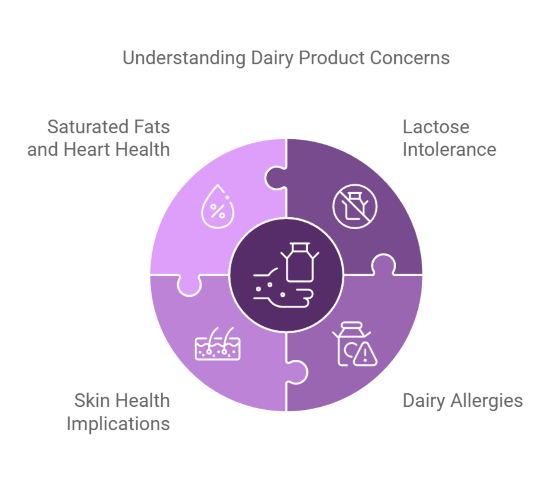1. Introduction
1.1 Overview of Dairy Products in Diet
Dairy products have been a staple in human diets for centuries, valued for their versatility and nutritional benefits. From milk and cheese to yogurt and butter, these products are consumed worldwide in various forms. They are often included in meals, snacks, and even beverages, making them a significant part of many cultural cuisines. Dairy products are also key ingredients in countless recipes, contributing to both flavor and texture. Their widespread availability and affordability have made them a go-to source of essential nutrients like calcium, protein, and vitamins. However, as dietary trends evolve, questions about their role in a balanced diet have become more prominent.
1.2 Why This Question Matters
The question of whether dairy products are good for everyone is increasingly relevant as dietary preferences and health concerns shift. While some individuals thrive on diets rich in dairy, others experience adverse effects such as lactose intolerance or allergies. Additionally, the rise of plant-based diets and concerns about sustainability have led many to reconsider traditional dairy consumption. Understanding the benefits and potential drawbacks of dairy products is crucial for making informed dietary choices that align with individual health needs, ethical considerations, and lifestyle preferences. This discussion impacts not only personal health but also broader food industry trends.
Affiliate Disclaimer
This blog post may include links to affiliate sites. If you click on an affiliate link and make a purchase, we may earn a small commission or receive other compensation at no extra cost to you. Please note that many of the links on our site are affiliate links. Our use of these links does not impact the products, services, or websites we recommend to you. This disclaimer covers all forms of communication with you, including our website, email, phone, social media, products, and other platforms.
Amazon Affiliate Disclaimer
We participate in the Amazon Services LLC Associates Program, an affiliate marketing program that allows us to earn fees by linking to Amazon.com and its affiliated sites. If you click on an Amazon affiliate link on our site and make a purchase, we may receive a small commission at no additional cost to you.
2. Nutritional Benefits of Dairy Products
2.1 Rich Source of Calcium and Vitamin D
Dairy products are widely recognized as one of the best dietary sources of calcium, a mineral essential for maintaining strong bones and teeth. Calcium plays a crucial role in preventing osteoporosis, especially in older adults, and supports proper muscle function and nerve signaling. Many dairy products, such as milk, are also fortified with vitamin D, which enhances calcium absorption and contributes to bone health. This combination of calcium and vitamin D makes dairy a cornerstone of many dietary guidelines worldwide, particularly for children, adolescents, and seniors who require higher intake to support growth or prevent bone loss.
2.2 Protein and Its Role in Muscle Health
Another key benefit of dairy products is their high-quality protein content. Dairy contains complete proteins like casein and whey, which provide all essential amino acids needed for muscle repair and growth. This is particularly beneficial for athletes, active individuals, and those recovering from injuries. Whey protein, in particular, is known for its rapid absorption and effectiveness in promoting muscle recovery after exercise. Including dairy products like yogurt or milk in meals can help meet daily protein requirements while supporting overall health.

2.3 Other Essential Nutrients in Dairy
In addition to calcium, vitamin D, and protein, dairy products are packed with other vital nutrients. They are a good source of potassium, which helps regulate blood pressure by counteracting sodium's effects. Phosphorus in dairy supports bone health and energy production, while B vitamins like riboflavin (B2) and vitamin B12 contribute to energy metabolism and red blood cell formation. These nutrients make dairy products a nutrient-dense food group that can enhance overall diet quality. By providing a range of essential nutrients in one package, dairy products offer significant health benefits when consumed as part of a balanced diet tailored to individual needs and preferences.
3. Potential Issues with Dairy Products
3.1 Lactose Intolerance: A Common Concern
One of the most frequently cited issues with dairy products is lactose intolerance, a condition where the body lacks sufficient lactase enzyme to digest lactose, the sugar found in milk. This can lead to symptoms such as bloating, diarrhea, and abdominal discomfort after consuming dairy products. Lactose intolerance affects a significant portion of the global population, particularly among individuals of Asian, African, and Indigenous descent. While some people can tolerate small amounts of dairy, others may need to avoid it entirely or opt for lactose-free alternatives to prevent discomfort.

3.2 Allergies to Dairy Proteins
Another concern associated with dairy products is allergies to proteins like casein and whey. Unlike lactose intolerance, which involves digestion issues, dairy allergies trigger an immune response that can range from mild symptoms like hives and nasal congestion to severe reactions such as anaphylaxis. Dairy allergies are more common in children but can persist into adulthood for some individuals. For those affected, even trace amounts of dairy products can pose serious risks, necessitating complete avoidance.
3.3 Impact on Skin: Acne and Dairy
There is ongoing debate about the relationship between dairy products and skin health, particularly acne. Some studies suggest that consuming certain types of dairy, such as skim milk, may exacerbate acne due to hormonal components or insulin-like growth factor-1 (IGF-1) present in milk. However, the evidence is not conclusive, and individual responses vary widely. People prone to acne may choose to monitor their dairy intake to determine if it affects their skin.
3.4 Concerns Around Saturated Fats and Heart Health
Dairy products like whole milk, cheese, and butter are often high in saturated fats, which have been linked to increased cholesterol levels and a higher risk of heart disease in some studies. While recent research suggests that not all saturated fats have the same impact on cardiovascular health, moderation is key when consuming full-fat dairy products. Low-fat or non-fat options can be good alternatives for those concerned about heart health. Understanding these potential issues helps individuals make informed decisions about incorporating dairy products into their diet based on their unique health needs and tolerances.
4. Are Dairy Products Suitable for Different Groups?
4.1 Children and Dairy Consumption
Dairy products play a vital role in the diets of children, providing essential nutrients like calcium, vitamin D, and protein that support growth and development. These nutrients are crucial for building strong bones and teeth during formative years. Pediatric dietary guidelines often recommend milk and other dairy products as a primary source of these nutrients. However, some children may experience lactose intolerance or dairy allergies, which require parents to seek alternatives like fortified plant-based milk or lactose-free options. For most children without these concerns, moderate consumption of dairy products can significantly contribute to their overall health.
4.2 Dairy for Adults and Seniors
For adults, dairy products can help maintain bone density and prevent conditions like osteoporosis, especially for women post-menopause who are at higher risk of bone loss. Seniors also benefit from the high calcium and vitamin D content in dairy, which supports bone health and reduces the risk of fractures. Additionally, the protein in dairy products is valuable for preserving muscle mass as people age. However, some adults may need to monitor their intake of full-fat dairy due to concerns about saturated fats and heart health. Choosing low-fat or non-fat options can help balance nutritional benefits with potential risks.
4.3 Athletes and Active Individuals
Athletes and those with active lifestyles often turn to dairy products as a convenient source of high-quality protein for muscle repair and recovery. Products like milk or yogurt are also rich in carbohydrates, making them ideal for replenishing energy stores after exercise. Whey protein, a byproduct of dairy, is particularly popular among athletes due to its rapid absorption and effectiveness in promoting muscle growth.
4.4 Dairy Products in Plant-Based or Vegan Diets
For individuals following plant-based or vegan diets, traditional dairy products are not an option. However, there are numerous plant-based alternatives such as almond milk, soy milk, and oat milk that are often fortified with calcium, vitamin D, and other nutrients found in dairy. These alternatives allow individuals to meet their nutritional needs without consuming animal-derived products.
5. Alternatives to Traditional Dairy Products
5.1 Lactose-Free Dairy Options
For those who experience lactose intolerance but still wish to enjoy the benefits of dairy products, lactose-free options provide a viable solution. These products are made by adding lactase enzyme to regular dairy, breaking down lactose into simpler sugars that are easier to digest. Lactose-free milk, cheese, and yogurt offer the same nutritional benefits as their conventional counterparts, including calcium, protein, and vitamin D, without causing digestive discomfort. This allows individuals with lactose intolerance to continue consuming dairy products without compromising their dietary preferences or nutritional intake.

5.2 Plant-Based Dairy Alternatives
Plant-based dairy alternatives have surged in popularity as more people seek to reduce their consumption of animal products for health or ethical reasons. These alternatives include almond milk, soy milk, oat milk, and coconut milk, among others. They are typically lower in fat and calories compared to traditional dairy products and are often fortified with essential nutrients like calcium and vitamin D to match the nutritional profile of cow's milk.
Plant-based yogurts and cheeses made from nuts or legumes provide additional options for those seeking dairy-free diets. These alternatives cater to vegans, those with dairy allergies, and anyone looking to diversify their diet with plant-based options.
5.3 Fortified Non-Dairy Products
Fortification is a key aspect of making plant-based dairy alternatives nutritionally comparable to traditional dairy products. Many non-dairy milks and yogurts are fortified with calcium, vitamin B12, and vitamin D to ensure they provide similar health benefits.
This fortification is crucial for individuals who rely on plant-based alternatives as their primary source of these nutrients. Additionally, some products are enriched with protein to enhance their nutritional value further. When choosing fortified non-dairy products, it is important to check labels for added sugars and ensure they meet individual dietary needs.
The rise of these alternatives reflects a broader shift towards more sustainable and inclusive dietary practices. By offering a range of options that cater to different dietary restrictions and preferences, plant-based and lactose-free dairy alternatives allow individuals to enjoy the taste and nutritional benefits of dairy products while aligning with their health goals and ethical values.
6. Tips for Choosing the Right Dairy Products
6.1 Understanding Labels and Nutritional Content
When selecting dairy products, it is essential to read labels carefully to make informed choices. Pay attention to the nutritional content, including calories, protein, fat, and sugar levels. Many flavored dairy products, such as fruit yogurts or chocolate milk, contain added sugars that can contribute to excess calorie intake. Opting for unsweetened or low-sugar versions can help maintain a balanced diet. Additionally, check for fortification with nutrients like vitamin D and calcium, especially if these are priorities in your diet. For individuals with dietary restrictions, labels can also indicate whether a product is lactose-free or suitable for specific needs.
6.2 Organic and Grass-Fed Dairy Products
Organic and grass-fed dairy products have gained popularity due to their perceived health and environmental benefits. Organic dairy comes from cows raised without synthetic hormones, antibiotics, or genetically modified feed. Grass-fed dairy products are derived from cows that primarily graze on pasture, which may result in higher levels of certain nutrients like omega-3 fatty acids and conjugated linoleic acid (CLA). While these options can be more expensive, they appeal to consumers seeking minimally processed foods and sustainable farming practices. When choosing organic or grass-fed options, look for certifications that verify their authenticity.
6.3 Balancing Moderation with Variety
Although dairy products offer numerous health benefits, moderation is key to maintaining a balanced diet. Consuming excessive amounts of full-fat dairy may lead to increased saturated fat intake, which could affect heart health in some individuals. Incorporating a variety of dairy products—such as milk, yogurt, and cheese—can help diversify nutrient intake while preventing over-reliance on any single type of food. For those who prefer plant-based alternatives or need lactose-free options, integrating fortified non-dairy products into the diet ensures nutritional needs are met without compromising on variety.
7. Conclusion
7.1 Summarizing the Pros and Cons of Dairy Products
Dairy products are a nutrient-dense food group that offers a wide range of health benefits, including being an excellent source of calcium, vitamin D, and high-quality protein. They support bone health, muscle repair, and overall dietary quality. However, they are not without potential drawbacks. Issues such as lactose intolerance, dairy allergies, and concerns about saturated fats or skin health highlight the need for individual consideration when incorporating dairy into a diet. Additionally, the rise of plant-based diets has prompted many to explore alternatives to traditional dairy products.
7.2 Tailoring Choices to Individual Needs
The suitability of dairy products depends largely on individual health conditions, dietary preferences, and lifestyle choices. For those who tolerate them well, dairy can be a valuable part of a balanced diet. However, for individuals with lactose intolerance, allergies, or ethical concerns, alternatives such as lactose-free options or fortified plant-based products provide viable solutions. The key is to make informed decisions based on personal needs while ensuring adequate nutrient intake. Ultimately, whether or not dairy products are good for everyone depends on individual circumstances. By understanding their benefits and limitations, people can make choices that align with their health goals and dietary values.
Top 7 FAQs
- What are the main nutritional benefits of dairy products?
Dairy products are rich in essential nutrients like calcium, vitamin D, and high-quality protein, which support bone health, muscle repair, and overall wellness. - Can people with lactose intolerance still consume dairy products?
Yes, individuals with lactose intolerance can opt for lactose-free dairy products or consume fermented options like yogurt, which are easier to digest. - Do dairy products cause acne or skin issues?
Some studies suggest that certain dairy products, like skim milk, may contribute to acne in some individuals, but the evidence is not conclusive and varies by person. - Are plant-based alternatives as nutritious as traditional dairy products?
Plant-based alternatives can be fortified with nutrients like calcium and vitamin D but often lack the high-quality protein found in traditional dairy products. - How much dairy should I include in my diet daily?
Dietary guidelines recommend 2-3 servings of dairy products per day, depending on age and life stage, to meet nutrient needs. - Are full-fat dairy products healthy?
Emerging research suggests that full-fat dairy can fit into a healthy diet when consumed in moderation as part of a balanced eating plan. - What are the best options for those who avoid animal-based dairy products?
Fortified plant-based alternatives like soy milk or almond milk can provide essential nutrients similar to traditional dairy products for those following vegan or plant-based diets.


